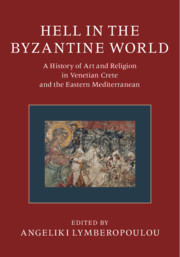 Hell in the Byzantine World
Hell in the Byzantine World 4 - Hell from West to East: Western Resonances in Cretan Wall Painting
from Part I - Crete
Published online by Cambridge University Press: 02 October 2021
Summary
Rembrandt Duits focuses on the Western aspect of Italo-Byzantine cultural and artistic interaction and thus expands the geographical setting of the Cretan representations of Hell. His chapter presents a new perspective on the origins of certain elements in the Cretan images of Hell, which he points out have parallels in Western – particularly Italian - art. He draws on a representative sample of 25 per cent of all the Cretan wall paintings showing Hell that appear to deviate from pre-established Byzantine traditions. The geographical dispersion and chronological range of the sample mean that this iconographic divergence cannot be explained as the impact of a single Cretan master or a local ‘school’. Duits draws our attention to iconographic elements that suggest an interaction of Cretan and Italian artists, such as devils pulling souls by ropes or chains, frontally rendered processions of sinners, the double-headed Dragon of the Depths, the structure of Hell, and inscriptions that identify certain sinners. He argues that while there are no clear formal derivations of Western art in Cretan Hell scenes, there is nonetheless a strong suggestion that Cretan painters were aware of certain trends in the Italian rendition of Hell.
- Type
- Chapter
- Information
- Hell in the Byzantine WorldA History of Art and Religion in Venetian Crete and the Eastern Mediterranean, pp. 191 - 234Publisher: Cambridge University PressPrint publication year: 2020
